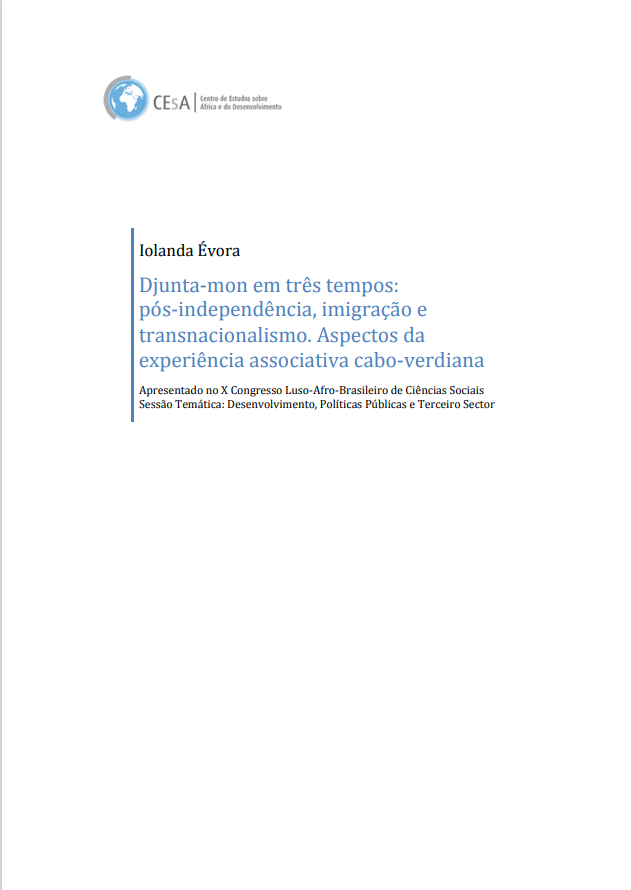Djunta-mon em Três Tempos: Pós-independência, imigração e transnacionalismo. Aspectos da experiência associativa cabo-verdiana

Title: Djunta-mon em Três Tempos: Pós-independência, imigração e transnacionalismo. Aspectos da experiência associativa cabo-verdiana
Author(s): Évora, Iolanda
Publication Date: 2011
Publisher: ISEG - CEsA
Quotation: Évora, Iolanda. 2011. "Djunta-mon em três tempos: pós-independência, imigração e transnacionalismo. Aspectos da experiência associativa cabo-verdiana". Comunicação apresentada no X Congresso Luso-Afro-Brasileiro de Ciências Sociais, Sessão Temática Desenvolvimento, Políticas Públicas e Terceiro Sector
Abstract: This study focuses on voluntary associations and discusses the material and psychosocial conditions of membership and participation of members. These aspects are analyzed from the point of view of the members of cooperatives in the rural area of the island of Santiago, created in the post-independence period, and of Cape Verdean immigrant associations in Portugal. In Santiago, we identified both singular forms of appropriation of the official ideological base and governmental objectives, as well as cultural permanences that, through practices such as djunta-mon, ensure the protection of social identities and allow familiarity and subjective control of this social practice. . In immigration, spontaneous associations propose to maintain identity, promote social inclusion or solve common problems and needs and reflect the heterogeneity, social cleavages and class divisions of origin that are reproduced in immigration. Currently, formal demands for greater rigor and technical and human competence in its functioning seem to weaken spontaneous and voluntary adhesion and the djunta-mon. At the same time, it questions the traditional role of these associations in the face of changes in immigration with the inclusion of new profiles such as transnational migrants. We examine the adaptability of this collective strategy, indicating that in the past, in the present and in the face of the possibility of a transnational associative practice, the use of the traditional djunta mon adapted to the lived context, ensures the maintenance of the strong network of reciprocity and sociability essential to survival and success. of the associations.
Identifier: http://hdl.handle.net/10400.5/2953
Category: Working paper
Abstract:
Djunta-mon em três tempos: pós-independência, imigração e transnacionalismo. Aspectos da experiência associativa cabo-verdiana focuses on voluntary associations and discusses the material and psychosocial conditions of membership and participation of members. These aspects are analyzed from the point of view of the members of cooperatives in the rural area of the island of Santiago, created in the post-independence period, and of Cape Verdean immigrant associations in Portugal. In Santiago, we identified both singular forms of appropriation of the official ideological base and governmental objectives, as well as cultural permanences that, through practices such as djunta-mon, ensure the protection of social identities and allow familiarity and subjective control of this social practice. . In immigration, spontaneous associations propose to maintain identity, promote social inclusion or solve common problems and needs and reflect the heterogeneity, social cleavages and class divisions of origin that are reproduced in immigration. Currently, formal demands for greater rigor and technical and human competence in its functioning seem to weaken spontaneous and voluntary adhesion and the djunta-mon. At the same time, it questions the traditional role of these associations in the face of changes in immigration with the inclusion of new profiles such as transnational migrants. We examine the adaptability of this collective strategy, indicating that in the past, in the present and in the face of the possibility of a transnational associative practice, the use of the traditional djunta mon adapted to the lived context, ensures the maintenance of the strong network of reciprocity and sociability essential to survival and success. of the associations.
Quotation:
Évora, Iolanda. 2011. “Djunta-mon em três tempos: pós-independência, imigração e transnacionalismo. Aspectos da experiência associativa cabo-verdiana”. Comunicação apresentada no X Congresso Luso-Afro-Brasileiro de Ciências Sociais, Sessão Temática Desenvolvimento, Políticas Públicas e Terceiro Sector





